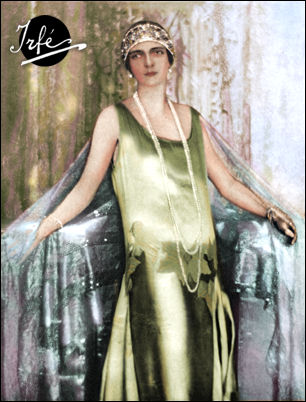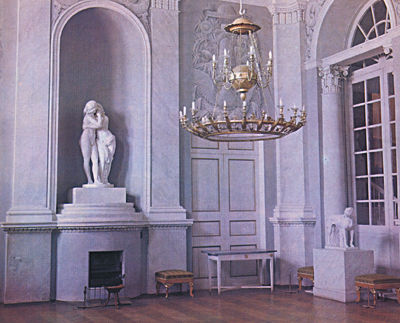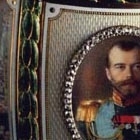The Russo-Japanese War - The Montenegrins - The Reval conferences.
 Left: Felix's wife Irina in France in the 1920's.
Left: Felix's wife Irina in France in the 1920's.
The war with Japan, one of the most terrible blunders made during the reign of Nicholas II, had disastrous consequences and marked the beginning of our misfortunes. Russia was not prepared for war, and those who encouraged the Tsar in his purpose betrayed their sovereign as well as their country.
Russia's enemies took advantage of the general dissatisfaction to set the Government and the masses against each other. Strikes broke out almost everywhere; there were several attempts on the lives of members of the Imperial family and of high government officials. The Tsar was forced to compromise and give the country a constitutional government by establishing the Duma. The Tsarina violently opposed this; she did not realize the seriousness of the situation, and would not admit that there was no other solution. (*The old Duma, composed solely of boyars (nobles), was suppressed by Peter the Great when he proclaimed himself absolute monarch.)
The Duma was opened on April 27, 1906. This was a moment of great anxiety for all, as everyone knew that the Duma was a two-edged sword which could prove either helpful or disastrous to Russia, according to the course of events.
At one o'clock the Imperial family went in great state to St. George's Hall in the Winter Palace. It was the first time that any room in this palace had ever seen such a mixed crowd of queerly dressed people. After the Te Deum had been sung, the Tsar delivered the inaugural speech. This first session made a painful impression on most of those present and filled them with dark forebodings.
If all the members of the Duma bad been loyal Russians actuated only by patriotic motives, the assembly might have done great service to the Government; but certain questionable and destructive elements made it a hothed of revolutionary ideas.
The political atmosphere grew heavier and heavier; the Duma was periodically dissolved, and attempts on the lives of prominent people grew more and more frequent.
Fresh complications arose when Gutchkov, a member of the junior Party, delivered a violent speech against the Government and the Grand Dukes. He thought it intolerable that the most important offices of state, and those which entailed the greatest responsibilities, should be entrusted to members of the Imperial family, for, be said, political immunity allowed their mistresses or their protegees to carry out dubious transactions with impunity.
The King of Montenegro's two daughters, the Grand Duchess Militza and her sister the Grand Duchess Anastasia Nicolaievna, played leading parts at the Court of Russia during this period. The first married the Grand Duke Peter Nicolalevich, the second married Prince Leucbtenberg and afterward the Grand Duke Nicholas Nicolaievitcb. In St. Petersburg, these two princesses were called "the black peril." They were much interested in occultism and lived surrounded by soothsayers and questionable prophets. It was through them that a French charlatan named Philippe, and later Rasputin, had access to the Imperial Court. Their palace was the central point of the powers of evil which so tragically bewitched our unhappy Tsar and Tsarina and plunged our country into the abyss.

One day as my father was walking by the seaside in the Crimea, he met the Grand Duchess Militza driving with a stranger. My father bowed, but she did not respond. Meeting her by chance a few days later, be asked her why she bad cut him. "You couldn't have seen me," said the Grand Duchess, "for I was with Dr. Philippe, and when he wears a hat he is invisible and so are those who are with him."
One of the Grand Duchess's sisters told me that as a child she had once hidden behind a curtain and seen Philippe enter the room; to her astonishment, all those present knelt and kissed his hand.
The Bible, in Leviticus 20:6, says: "And the soul that turneth after such as have familiar spirits, and after wizards, to go a wboring after them, I will even set my face against that soul, and will cut him off from among his people."
The two Grand Duchesses discovered their imprudence too late, and then tried in vain to open the eyes of the Tsar and Tsarina.
During the summer of 1906, it was learned in St. Petersburg that an attempt bad been made upon the life of Prime Minister Stolypin at his country house; it was said that a great many people had been killed.
As we knew that my mother had meant to call on the Prime Minister that afternoon, we were frantic with anxiety until she came home. She told us that the attempt had taken place a few minutes after she left, and that she heard the explosion just after getting into her carriage. Stolypin himself had not been hurt, but one of his daughters was seriously injured by the bomb.
A little later it was rumored that another attempt had been made, this time upon the Imperial family, which was cruising in the Finnish Archipelago aboard the yacht Standart, as it did each autumn.
Exactly what happened was never known. Some said that the yacht struck a mine laid by revolutionaries, others that it had run onto some rocks, and that only the fact that the ship was sailing at low speed averted a catastrophe. However that may be, the the Imperial party returned safe and sound aboard the Polar Star, which the Dowager Empress sent to bring them home.
That same summer, King Edward VII and Queen Alexandra of England were expected on a visit. Their meeting with the Tsar and the Tsarina was to take place at Reval. When the royal couple reached Reval on the Victoria and Albert, King Edward, who had neglected to try on the Russian uniform in which he was to meet the Tsar, discovered it was so tight that he could not button it; a tailor was summoned hastily but found it impossible to make the necessary alterations at such short notice. So the King went to lunch aboard the Polar Star in a state of semisuffocation and in a very bad temper.
This interview between the Tsar and the King of England greatly alarmed public opinion in Germany. Germany considered it dangerous for Russia to trust England, whom she regarded as Russia's bitterest enemy. Many Russians shared this opinion; they were the ones wbo disapproved of the alliance concluded with France by Alexander III, urging that an empire could not be allied to a republic against another empire, and that only an alliance between Russia, France and Germany could guarantee peace in Europe.
The Imperial family returned to Reval to receive M. Fallieres, President of the French Republic, but the reception given him lacked the splendor which had marked that of the King and Queen of England. This did not escape the French, who were, it seems, extremely displeased.
For questions or comments about this online book contact Bob Atchison.

